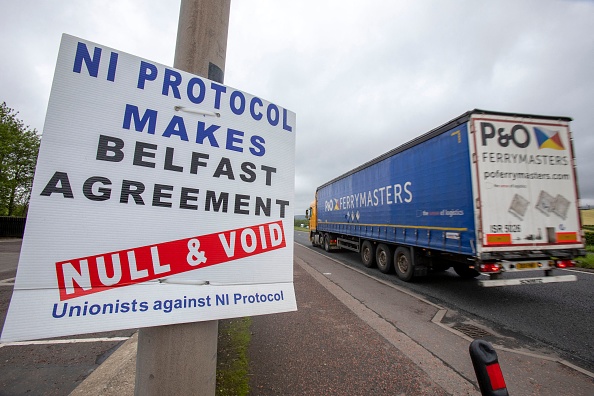Truss unveils ‘reasonable’ bill to rip up Northern Ireland Protocol

The UK has unveiled new legislation that will rip up large parts of the post-Brexit Northern Ireland Protocol, with a new bill handing ministers powers to unilaterally “fix” anything they deem to be problematic.
The legislation will scrap most checks on goods crossing the Irish Sea and allow Great Britain’s businesses to designate themselves whether or not the goods they are sending to Northern Ireland require customs checks.
Brussels has condemned the new legislation as a breach of international law, with EU officials indicating they will launch legal proceedings.
European Commission Vice President Maros Sefcovic has confirmed Brussels has no interest in changing the text of the protocol, setting up a major UK-EU showdown in the coming weeks and months.
A Number 10 source said the bill “protects the integrity of the UK, while safeguarding the EU’s single market” and Boris Johnson said the changes were “trivial adjustments”.
Northern Ireland still follows the EU’s customs union and single market rules, unlike the rest of the UK, in order to avoid a hard border with the Republic of Ireland.
Post-Brexit checks on goods going from Great Britain to Northern Ireland, enforced to protect the EU’s single market, have created economic and political disruption as unionists complain about a new border in the Irish Sea.
The new bill sets out ambitions for the UK to create a “green lane” to allow goods intended only for Northern Ireland to pass without checks, while products that are being transited into the Republic of Ireland will be put into a “red lane” and require border checks.
It also ends the role of the European Court of Justice as the body responsible for enforcing the protocol, with ambitions to instead create an independent arbiter, and gives powers to UK ministers to unilaterally “fix” problems they identify.
Truss said the changes “will end the untenable situation where people in Northern Ireland are treated differently to the rest of the United Kingdom, protect the supremacy of our courts and our territorial integrity”.
“We are ready to deliver this through talks with the EU. But we can only make progress through negotiations if the EU are willing to change the Protocol itself – at the moment they aren’t,” she said.
The government is arguing the changes do not breach international law as the current situation in Northern Ireland is damaging the integrity of the Good Friday peace agreement and therefore “constitutes a state of necessity”.
An official legal argument from the government states it is a norm in international law to be able to “lawfully justify situations where the only way a state can safeguard an essential interest is the non-performance of another international obligation”.
When asked if the new legislation breaks international law, Johnson told LBC today that the UK has a “higher and prior legal commitment” to the Good Friday Peace Agreement.
“What we have to respect — and this is the crucial thing — the balance and the symmetry of the Belfast Good Friday agreement,” he said.
Michelle O’Neill, President of Sinn Fein, said: “The unilateral actions of Boris Johnson are utterly reckless. It is clearly a breach of international law.
“The impact on our businesses & economy could be colossal. The pro-protocol parties have jointly written to Boris Johnson today to firmly reject his legislation and approach.”
Richard Burge, chief executive of the London Chamber of Commerce and Industry (LCCI), said: “We are hugely concerned that the introduction of the Government’s Northern Ireland Bill, published today, risks significant harm to businesses in London and right across the whole of the UK.
“Getting Brexit done was at least meant to deliver certainty to businesses after years of waiting for clarity on the future of the UK’s trade relations with the European Union. The introduction of this bill means we are now teetering on the brink of a trade war with the EU and that will mean further economic pain and falls in investment.”